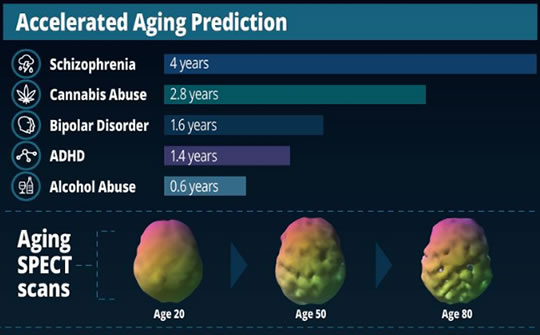Largest ever study of its type reveals the disorders that accelerate brain aging.
Schizophrenia, cannabis abuse and bipolar disorder accelerate brain aging the most, new research finds.
Schizophrenia ages the brain by an average of 4 years, cannabis abuse by 2.8 years and bipolar disorder by 1.6 years.
Fifth on the list, behind ADHD, was alcohol abuse, which ages the brain by an average of 1.4 years.
Depression and anxiety, however, were not linked to any premature brain aging.

Dr Daniel G. Amen, who led the study, said:
“Based on one of the largest brain imaging studies ever done, we can now track common disorders and behaviors that prematurely age the brain.
Better treatment of these disorders can slow or even halt the process of brain aging.
The cannabis abuse finding was especially important, as our culture is starting to see marijuana as an innocuous substance.
This study should give us pause about it.”
The conclusions come from the largest ever study of its type of 62,454 brain scans on over 30,000 people.
The SPECT (single photon emission computed tomography) brain scans measured the regional blood flow in the brain and how it is reduced in different disorders.
Dr George Perry, commenting on the study, said:
“This is one of the first population-based imaging studies, and these large studies are essential to answer how to maintain brain structure and function during aging.
The effect of modifiable and non-modifiable factors of brain aging will further guide advice to maintain cognitive function.”
Mr Sachit Egan, co-investigator from Google, said:
“This paper represents an important step forward in our understanding of how the brain operates throughout the lifespan.
The results indicate that we can predict an individual’s age based on patterns of cerebral blood flow.
Additionally, groundwork has been laid to further explore how common psychiatric disorders can influence healthy patterns of cerebral blood flow.”
The study was published in the Journal of Alzheimer’s Disease (Amen et al., 2018; image credit, Dr Daniel G. Amen).

